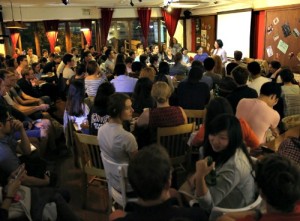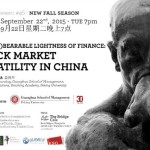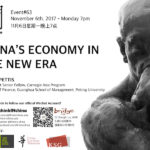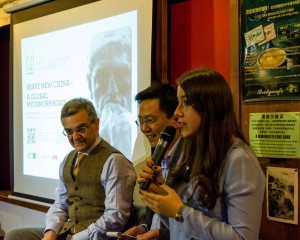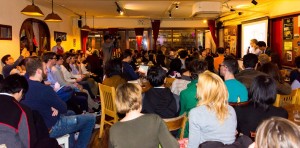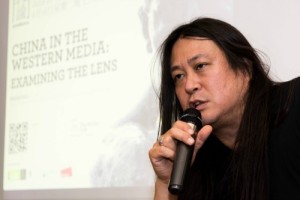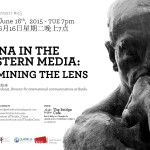-
01 Nov
#48 – Governing the socialist market: developmentalism and China
event #48, Monday, November 9th, 2015
Speakers
Robert WADE, Professor of Political Economy and Development, London School of Economics
Shaun BRESLIN, Professor of Politics and International Studies, University of Warwick
WANG Zhengyi, 王正毅, Professor of International Political Economy, Peking University
Giuseppe GABUSI, Professor of International Political Economy and Political Economy of East Asia, University of Torino
ABSTRACT
The year 2015 marks the 25th anniversary of the publication of Robert Wade’s seminal book “Governing the Market”. In his book, Wade elaborates a theory stressing the role of the state in economic development. As the consequences of the Great Recession are forcing many governments and the International Financial Institutions themselves to put into question their ideological stance of unfettered free markets, the anniversary marks the occasion to review the developmental state paradigm (DSP) debate and re-assess validity in the XXI century global political economy. Have financial crises in the 90s and the Great Recession itself generated more political support for DSP principles or have neoliberal attempted solutions to the same crises undermined the tenets of developmental state theories? Are DSP policy measures still feasible (and desirable) in a globalized era dominated by global value chains? With an eye to the Chinese experience in the past decades, the roundtable will discuss whether the key principles of the DSP – as properly understood – are still valid, and what lessons developing countries can learn from China’s developmental trajectory.
Related Posts
- 10000
 Robert WADE, Professor of Political Economy and Development, London School of Economics Shaun BRESLIN, Professor of Politics and International Studies, University of Warwick WANG Zhengyi, 王正毅, Professor of International Political Economy, Peking University Giuseppe GABUSI, Professor of International Political Economy and Political Economy of East Asia, University of Torino…
Robert WADE, Professor of Political Economy and Development, London School of Economics Shaun BRESLIN, Professor of Politics and International Studies, University of Warwick WANG Zhengyi, 王正毅, Professor of International Political Economy, Peking University Giuseppe GABUSI, Professor of International Political Economy and Political Economy of East Asia, University of Torino… - 10000November 9th, 2015 Governing the socialist market: developmentalism and China. Supplementary materials Wade, Robert Hunter. 2010. After the Crisis: Industrial Policy and the Developmental State n Low-Income Countries, Global Policy, 1(2), 150-161. Wade, Robert Hunter. 2011. Why Justin Lin's Door-Opening Argument Matters for Development Economics: a Response to "Six…
- 10000
 November 9th, 2015 Bridge Cafe (Wudaokou) Speaker: Robert WADE, Professor of Political Economy and Development, London School of Economics Shaun BRESLIN, Professor of Politics and International Studies, University of Warwick WANG Zhengyi, 王正毅, Professor of International Political Economy, Peking University Giuseppe GABUSI, Professor of International Political Economy and Political Economy of East Asia, University…
November 9th, 2015 Bridge Cafe (Wudaokou) Speaker: Robert WADE, Professor of Political Economy and Development, London School of Economics Shaun BRESLIN, Professor of Politics and International Studies, University of Warwick WANG Zhengyi, 王正毅, Professor of International Political Economy, Peking University Giuseppe GABUSI, Professor of International Political Economy and Political Economy of East Asia, University…
Read more... -
25 Oct
#47 event report – Innovative China: Alibaba’s rural strategy and its international implications
October 13th, 2015 Bridge Cafe (Wudaokou)
Speaker:
Ying LOWREY, 刘鹰, Professor of Economics, Tsinghua University; Deputy Director of Tsinghua Research Center for Chinese Entrepreneurs.
Presentation:
Five hundred million and counting. China has more internet users than the entire population of the United States, and recently disclosed government plans are aimed at connecting over one billion users to 3G or 4G mobile networks by 2020. Not surprisingly, with a quickly proliferating internet use came the unprecedented growth of China’s e-commerce: a market which in 2014 reached a net worth of over 440 billion USD. Despite facing innumerable competitors, it comes as no surprise that companies such as Alibaba and JD are making sizable profits, attracting China’s increasingly urban population to their online stores.
Yet, as argued by Tsinghua University Professor Ying Lowrey, focusing on success stories of everyday online retail may not do justice to a much broader phenomenon that is currently taking China by storm.
According to Prof. Lowrey, in fact, Alibaba is doing much more than dominating over China’s e-commerce landscape; rather, it is allowing the country’s overall economy to grow by means of a new economic model – one based on “unleashing grassroots entrepreneurship”.
At the very heart of this innovative model lies the expertise of small retailers, manufacturers, artisans, and farmers eager to expand their market by turning locally-sourced goods (or agricultural produce) into commodities available nationwide, if not internationally.
Often times, however, China’s most geographically dispersed peoples pay the price of living away from urban centers by not having access to the technology that would allow their business to grow. Small business owners and entrepreneurs thus find themselves stuck in their local reality, often having to deal with a stagnant market that leaves no room for progress and innovation.
“That’s when Alibaba comes in”, commented Prof. Lowrey. After claiming the record for the world’s largest US-listed initial public offering last year, in fact, Alibaba decided to ensure its further development by investing over 10 billion RMB in what became known as the company’s ‘Rural E-Commerce Strategy’ – an initiative meant to give greater visibility to rural entrepreneurs. At the time, the e-commerce giant invested in 1000 counties across Mainland China, while kick-starting micro financing projects in a total of 100,000 villages for the establishment of so-called “Taobao Village Stations”. Each Taobao Village Station “would then be equipped with the technology and infrastructure necessary to allow each community, however small, to be connected to the internet in a fast and secure way”, Prof. Lowrey explained. Statistics have shown that the establishment of Taobao Villages around China lead to astounding results: by June 2014, the population of China’s rural netizens had grown by 28.2%, 84.6% of whom mainly rely on mobile internet services.
Addressing the question of what made Alibaba’s visions of net-preneurship possible in rural China, Prof. Lowrey mentioned Alibaba’s shift to Big Data technology and the establishment of AliCloud. In Lowrey’s view, “the greater a company’s computing power, the greater its possibility to join the e-commerce community in an efficient way”. This is certainly true for the Chinese e-commerce juggernaut; at present, in fact, Alibaba’s servers support the capacity of 17 million website access per minute. Greater computing power thus equips “a country, a business, a school, or even an individual” with competitive advantages that become all the more crucial within the e-commerce realm. Today, after having switched to Big Data and having reaped the benefits of the use of AliCloud, Alibaba hopes for Chinese businesses to move away from IT (information technology) systems to DT (data technology) ones. This much needed structural change, Lowrey argues, would eventually allow Chinese businesses to perform even more complex tasks, such as “implementing systems for the traceability of agricultural products” and improve the overall security of foodstuffs sold across China. At the same time, greater traceability would possibly lead to the emergence of what Lowrey defines ‘the invisible moral standard’, whereby producers and manufacturers feel compelled to provide the best service they can offer and selling the best products, while not allowing counterfeit ones to enter the e-marketplace.
As Big Data helped Alibaba bring the “Rural E-Commerce Strategy” to its full realization, the company now seeks to “employ the same technology to increase its competitiveness on a global scale, alongside promoting cross-border”, Prof. Lowrey said. In fact, Alibaba’s new long term vision consists in “fostering a collaborative e-ecosystem of various international partners that will serve the world’s 2 billion consumers with the most highly efficient logistic services at the company’s disposal”. Seeing this vision fully take shape may require a decade of efforts on Jack Ma’s side; yet, the prospect of giving rise to an economic system that is almost entirely based on the success of smaller-scale entrepreneurs (“mass flourishing”) worldwide is too rewarding for Alibaba not to continue following its development strategies in the foreseeable future.
For the time being, what is certain is that the growing popularity of net-preneurship initiatives will continue fostering China’s “willingness, capability and aspiration to innovate” – the fundamental driving force behind every successful economy.
Q&A:
Responding to a question on what could be identified as Alibaba’s key to success, Lowrey spoke about the ‘Alibaba Way’ by paraphrasing a famous Chinese proverb: “Give people a day’s profits, and they’ll eat for a day. Teach people how to do business, and they’ll thrive for life”. The core of Alibaba’s competitive strategy, therefore, lies in the company’s ability to empower entrepreneurs at across all levels of society. Lowrey calls this “growing by unleashing”, and believes Alibaba has gone to great lengths in its effort to improve China’s contemporary business culture.
Addressing a question on the challenges that the ‘Alibaba-model’ may face in the foreseeable future, Professor Lowrey argued that China’s leading e-commerce firm always seeks new strategies to favor its future development, and it is thus likely to deal with potential with relative ease. Further, when asked to elaborate on what Alibaba’s future might entail, Lowrey argued that the results obtained upon having implemented the ‘Rural E-Commerce Strategy” are indicative of how the company should continue providing support to small businesses and invest in micro-finance projects across China. “Alibaba knows that society needs constant innovation”, Lowrey said, “and I hope it will be able to hold on to that principle”. Yet, if ever there was a concrete obstacle for Alibaba and the realization of its visions, that may come from three parts: one is the State’s pervasive bureaucracy, or its excessively tight regulations; the second one is the severe competition from domestic and international markets; and the third is themselves. As media has noticed that Alibaba has involved in very intensive capital operations in purchasing businesses from all spectumes. I am a little worried about the remaining impact of 20th century Wall Street on Alibaba that might lead to a direction foucing on short-term profit gaining rather than the long term wellbeing.
Written by Carlotta Clivio
Related Posts
- 85
 event #47, Tuesday, October 13th, 2015 Speaker Ying LOWREY, 刘鹰, Professor of Economics, Tsinghua University; Deputy Director of Tsinghua Research Center for Chinese Entrepreneurs. ABSTRACT China's e-commerce market had revenue of 2.79 trillion RMB yuan in 2014 and, even with the economic slowdown and the recent stock market collapse, e-commerce…
event #47, Tuesday, October 13th, 2015 Speaker Ying LOWREY, 刘鹰, Professor of Economics, Tsinghua University; Deputy Director of Tsinghua Research Center for Chinese Entrepreneurs. ABSTRACT China's e-commerce market had revenue of 2.79 trillion RMB yuan in 2014 and, even with the economic slowdown and the recent stock market collapse, e-commerce…
Read more... -
08 Oct
#47 – Innovative China: Alibaba’s rural strategy and its international implications
event #47, Tuesday, October 13th, 2015
Speaker
Ying LOWREY, 刘鹰, Professor of Economics, Tsinghua University; Deputy Director of Tsinghua Research Center for Chinese Entrepreneurs.
ABSTRACT
China’s e-commerce market had revenue of 2.79 trillion RMB yuan in 2014 and, even with the economic slowdown and the recent stock market collapse, e-commerce sales experienced a 37.7 percent growth in the first seven months of this year. After the Sep. 19th, 2014 listed on the New York Security Exchange, Alibaba has set up three strategies for its longterm growth: Big Data, Cross-Boarder Trading, and Rural E-commerce development. In particular, its rural initiative has created enormous spillover effect across China. The plan is to invest 10 billion RMB yuan in logistics, hardware, and training to expand its e-commerce model into 100,000 rural villages in the next five years. Key of this strategy is the creation of the Taobao Rural Service Centers: villagers can buy – and in the future sell – products online, paying through mobile phone apps, and picking up the items at local convenience stores.
E-commerce can shape a different future for China’s rural areas: college graduates have been returning home to set up online businesses, boosting household consumption and making enormous contributions in disseminating new technologies. In addition, Alibaba’s rural initiative will have great international implications, especially in the developing world.
Join Tsinghua professor Ying Lowrey, author of “Alibaba Model: Growing by Unleashing Grassroots Entrepreneurship”, for a new ThinkIN China event.
Related Posts
- 85
 October 13th, 2015 Bridge Cafe (Wudaokou) Speaker: Ying LOWREY, 刘鹰, Professor of Economics, Tsinghua University; Deputy Director of Tsinghua Research Center for Chinese Entrepreneurs. Presentation: Five hundred million and counting. China has more internet users than the entire population of the United States, and recently disclosed government plans are…
October 13th, 2015 Bridge Cafe (Wudaokou) Speaker: Ying LOWREY, 刘鹰, Professor of Economics, Tsinghua University; Deputy Director of Tsinghua Research Center for Chinese Entrepreneurs. Presentation: Five hundred million and counting. China has more internet users than the entire population of the United States, and recently disclosed government plans are…
Read more... -
08 Oct
#47 – reading list
October 13th, 2015
Innovative China: Alibaba’s rural strategy and its international implications
Supplementary Materials
- “Alibaba Innovation,” in the book entitled Anaemic Europe: How to Achieve Dynamism and Mass Flourishing, published by Springer International Publishing Company, 2015
- “Alibaba Microfinancing Service Innovations and China’s Financial Sector Transformation and Democratization,” XXV Villa Mondragone International Economic Seminar, June, 2013, Rome, Italy.
- “Rapid Invention, Slow Industrialization, and the Absent Innovative Entrepreneur in Medieval China”, with William Baumol, Proceedings of the American Philosophical Society, Vol.157, No.1, March 2013.
- “Developments in Women-owned Business, 1997-2007,” 2011 Office of Advocacy, U.S. Small Business Administration, http://www.sba.gov/sites/
default/files/rs385tot_0.pdf. - “Business Creation is Job Creation: Estimating Entrepreneurial Jobs,” the 2011 American Economic Association Annual Meeting, http://www.aeaweb.org/aea/
2011conference/program/ retrieve.php?pdfid=313. - “Race/Ethnicity and Establishment Dynamics 2002-2006,” November 2010, Office of Advocacy, U.S. Small Business Administration, http://archive.sba.gov/advo/
research/rs369tot.pdf. - “Gender and Establishment Dynamics, 2002-2006,” August 2010 Office of Advocacy, U.S. Small Business Administration, http://archive.sba.gov/advo/
research/rs368tot.pdf. - “Preference for Exerting Entrepreneurial Effort: a Neoclassical Model and Computational Simulation,” presented at the 2010 Society for the Advancement of Behavioral Economics conference. Upcoming in Journal of Socio Economics.
- “Startup Business Characteristics and Dynamics: A Data Analysis of the Kauffman Firm Survey,” Office of Advocacy Working Paper, http://archive.sba.gov/advo/
research/rs350tot.pdf, August, 2009 - “Entrepreneurial Activities: A Microeconomic Analysis,” 2008 American Economic Association Annual Meetings in New Orleans, http://papers.ssrn.com/sol3/
papers.cfm?abstract_id=1158147 with Vincy Fon, Jan. 2008. - “Minority Entrepreneurship in the USA,” in International Journal of Business and Globalisation, Inderscience Publishers, Volume 1, Number 2 / 2007, p.176-221, http://www.inderscience.com/
browse/index.php?journalID= 245&year=2007&vol=1&issue=2, - “Minority Business Development Index: A Data Report on American Minority-Owned Business,” Social Science Research network, May 7, 2007, http://papers.ssrn.com/sol3/
papers.cfm?abstract_id=984907 - “An Introduction to the Session Chaired by Ying Lowrey,” in Professor William Baumol’s conference publication on Entrepreneurship, Innovation, and the Growth Mechanism of the Free-Market Economies, Princeton University Press. 2007, http://press.princeton.edu/
titles/8439.html. - “Women in Business: A Demographic Review of Women’s Business Ownership,” 2006 Office of Advocacy, U. S. Small Business Administration, http://archive.sba.gov/advo/
research/rs280tot.pdf. - “An Examination of Entrepreneurial Effort,” 2006 American Economic Association Annual Meetings in Boston, http://www.aeaweb.org/annual_
mtg_papers/2006/0107_1430_ 0302.pdf. - “U.S. Sole Proprietorships: A Gender Comparison, 1985-2000,” U.S. Small Business Administration Office of Advocacy Working Paper, September 2005, http://archive.sba.gov/advo/
research/rs263tot.pdf. - “Dynamics of Minority-Owned Employer Establishments, 1997-2001,” SBA Publication, January 2005. http://www.sba.gov/advo/
research/rs251tot.pdf. - “Business Density, Entrepreneurship and Economic Well-Being,” 2005 American Economic Association Meeting in Philadelphia, http://www.aeaweb.org/annual_
mtg_papers/2005/0107_0800_ 0401.pdf.
Read more... -
05 Oct
Ying LOWREY
Ying LOWREY, 刘鹰 Professor of Economics, Tsinghua University; Deputy Director of Tsinghua Research Center for Chinese Entrepreneurs.
Dr. Ying LOWREY is an Economic Professor at School of Social Sciences, Tsinghua University and Deputy Director of Tsinghua Research Center for Chinese Entrepreneurs, Senior Researcher of Tsinghua Research Institute of Innovation Development, Senior Adviser for several privately owned Chinese enterprises, and research or government institutions. Her teaching and research interests include Economics of Innovation and Entrepreneurship in the Internet and Platform Economy, Modern Microfinance Market, Business Demographics, Characteristics of Business Owners, and the Role of Free Enterprise in the Macroeconomy. She received her economics Ph.D. from Duke University, economics MA from Yale University and mathematics BA from Wuhan University. Before joining Tsinghua University in 2012, she served as senior economist at the Office of Advocacy, U.S. Small Business Administration; she taught many economic courses at George Washington University as assistant professor and San Diego State University as instructional professor. She was an assistant researcher at the Economic Institute, Chinese Academy of Social Science and assistant professor at Wuhan University.
Read more... -
28 Sep
#46 event report: the (un)bearable lightness of finance – stock market volatility in china
September 22nd, 2015 Bridge Cafe (Wudaokou)
Speaker:
JIANG Guohua 姜国华, Professor of Accounting, Guanghua School of Management; Director of Operations, Yenching Academy, Peking University.
Presentation:
China’s ability to recover from the 2008 global recession came from its readiness to break every rule in the economic textbook. Yet, as illustrated by Prof. Jiang Guohua from Peking University’s Guanghua School of Management, surviving a global crisis doesn’t necessarily mean being able to tackle domestic financial challenges with the same ease.
Today, the PRC financial sector is faced with pressing issues such as ’policy uncertainty’ and what Nobel Prize winner Finn Kydland called ‘the disease of time-inconsistency’ – a governmental tendency to design policies that are only effective in the short term.
Bearing these conundrums in mind, how can we then make better sense of China’s stock market volatility, and what should we be expecting from the economy in years to come?
In a brief historical overview, Prof. Jiang traced the roots of China’s recent stock market turmoil. From 1949 to 1990, the top-down approach typical of central planning allowed the PRC government to set commodity prices in a tightly regulated market. Production and distribution were also planned: there was no need for marketing sales, and no plan to establish a market economy of supply and demand. Resources were allocated, consumption measured. Existing enterprises were either State Owned (SOEs) and fully financed by the central government, or collectives, mostly concentrated in rural areas.
The life of Chinese society was also subject to central planning. To this day, issues such as the confinement of human movement and the formal division between urban and rural areas lie at the very core of a possible reform on residential rights.
From 1978 onwards, the overall situation appeared to be taking a new turn. China’s closed economy underwent the so-called period of reform and opening up (改革开放, gaige kaifang), while market-oriented reforms gave new momentum to the country’s overall development. Yet, mechanisms of central planning and capital allocation still lived on, and the economy remained SOE-dominated. In the years following 1978, low SOE efficiency, lack of innovation and poor economic performances inevitably called for the implementation of a new set of reforms.
Within a few years, the government transferred control and residual claim rights to local authorities, at the same time implementing managerial responsibility systems that recognized greater autonomy to SOE managers. During the final stages of the reform path, private firms were allowed to enter the newly established market, while in the early 1990s SOEs were eventually restructured into shareholding companies, and the stock market was created. For the first time in the history of the PRC, the government started distancing itself from SOE ownership, no longer acting as a market regulator, but also as a shareholder.
In the early 2000s, what economists ridiculed as “state meddling” started to look like a thing of the past. Commentators worldwide began praising China for its economic management strategies, and the studying of financial markets “with Chinese characteristics” gained new popularity. Yet, when China’s economy started being hit by the repercussions of a financial crisis that was global in scope, it remained unclear how central authorities could have not prevented this situation from occurring.
In cases like this, as explained in detail by Prof. Jiang, the one main factor to blame is policy uncertainty, which in turn leads to strategy shortsightedness (also defined as the “short horizon problem”). Financial market policymaking in China is in fact tainted by an inherent lack of transparency, regulations remain vague, and the sudden changes that the central government can afford to make at SOE managerial levels generate uncertainty and mistrust among investors.
According to Prof. Jiang, if we were to search for the underlining causes of such instabilities, we would find them by looking back at the history of China’s economy. The legacy of central planning and state ownership, in fact, seems to be playing a determining role in China’s economy to this day.
First of all, state-ownership over most enterprises gives the central government power to achieve its priorities at all costs; secondly, State interest in China is still considered superior to the rights of the individual, causing investors to be more exposed to substantial risk; lastly, feelings of instability and uncertainty lead shareholders (including the government) to make short-sighted decisions, generally incompatible with business planning.
Within this context of uncertainty, China’s minor investors prefer to not become long-term shareholders (either of an SOE or of a private firm). In fact, “holding shares for longer time periods and waiting for firms to grow and expand appears riskier, and the frantic buying and selling of shares generates greater stock market volatility”, Prof. Jiang concluded.
For the future, China might have to find ways to fight against the so-called “time-inconsistency disease”, striving to design more far-sighted economic and financial policies that can ultimately prove to be efficient in the longer run.
Q&A:
Addressing a question about the existing similarities between China’s current economy and that of the United States in the years preceding the 1929 stock market crash, Prof. Jiang argued that even if investment in China is currently driven by speculation, Chinese investors have nothing to fear from a purely financial perspective. Alongside having learned their lessons from historical stock market crashes, in fact, Chinese investors are constantly learning from each other’s mistakes, and know exactly how to deal with market fluctuation without running too many risks at once.
Further elaborating on the implications of an ever-increasing government intervention in China’s economy, Prof. Jiang affirmed that China is indeed determined to continue moving along the path of openness and reform that it has been following for almost 40 years, and does not intend to turn back to greater central planning and government ownership of the market.
Asked to further illustrate what could be the inherent value of a Chinese stock, Prof. Jiang said that SOE and listed firms’ stocks are both greatly valuable. Yet, the stock market opened in China only in 1991: for many years, buying and selling shares was something entirely new to Chinese citizens, who often didn’t want to own any stocks by means of uncertainty and lack of trust. Central authorities thus decided to forcibly allocate shares between government workers, and people became motivated to buy shares only after those stocks yielded considerable returns. Today, the inherent value of Chinese stocks and profitable opportunities are the two main factors that have given investors renewed confidence in the market.
Responding to a question on whether China’s market volatility needs to be seen as the outcome of policy uncertainty, Prof. Jiang explained that we need to consider the Chinese government not just as a shareholder, but also as a market regulator. In the first quarter of this year, central authorities hoped to stimulate the economy by strengthening the confidence of investors in stock prices, attracting private money and channelling it into SOE and listed firms. Yet, the May 27th market crash was linked to insider trading operations orchestrated by market regulators and CEOs. Sure, policy unpredictability may as well be an investor’s worst enemy. Yet, the Shanghai stock market crash was indicative of how economists often need to take other factors into account when looking at China’s market volatility.
Report by Carlotta Clivio
Related Posts
- 10000
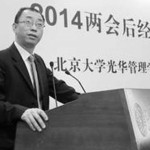 JIANG Guohua, 姜国华, Professor of Accounting, Guanghua School of Management; Associate Dean of Peking University Graduate School; Director of Operations of the Yenching Academy JIANG Guohua is currently Professor of Accounting at the Guanghua School of Management, Peking University, and serves also as an Associate Dean of Peking University Graduate School. He is…
JIANG Guohua, 姜国华, Professor of Accounting, Guanghua School of Management; Associate Dean of Peking University Graduate School; Director of Operations of the Yenching Academy JIANG Guohua is currently Professor of Accounting at the Guanghua School of Management, Peking University, and serves also as an Associate Dean of Peking University Graduate School. He is… - 10000
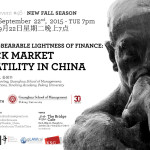 event #46, Tuesday, September 22nd, 2015 Speaker JIANG Guohua 姜国华, Professor of Guanghua School of Management and Associate Dean of the Peking University Graduate School ABSTRACT "Emerging from a planned/state-controlled economy and after the economic reform and open door policy of 1978, China launched its stock market in 1990.…
event #46, Tuesday, September 22nd, 2015 Speaker JIANG Guohua 姜国华, Professor of Guanghua School of Management and Associate Dean of the Peking University Graduate School ABSTRACT "Emerging from a planned/state-controlled economy and after the economic reform and open door policy of 1978, China launched its stock market in 1990.…
Read more... -
12 Sep
JIANG Guohua
JIANG Guohua, 姜国华, Professor of Accounting, Guanghua School of Management; Associate Dean of Peking University Graduate School; Director of Operations of the Yenching Academy
JIANG Guohua is currently Professor of Accounting at the Guanghua School of Management, Peking University, and serves also as an Associate Dean of Peking University Graduate School. He is an academic advisor to the Global Valuation Institute of KPMG International, an independent director at China Datang International Power Generation Co., LTD, Bank of Nanchang, and China CITIC Trust. He also serves as a senior investment consultant at Bosera Fund Management Company and he is one of the main engines behind PKU ground-breaking Yenching Academy. Professor Jiang received his B.A. in Economics from Guanghua School of Management, PKU, M.A. in Accounting from Hong Kong University of Science and Technology, and Ph.D. in Accounting from the University of California, Berkeley. His publications appeared in the Journal of Financial Economics, Review of Accounting Studies, Journal of the American Statistical Association, among others.
Read more... -
12 Sep
#46 – The (un)bearable lightness of finance: stock market volatility in China
event #46, Tuesday, September 22nd, 2015
Speaker
JIANG Guohua 姜国华, Professor of Guanghua School of Management and Associate Dean of the Peking University Graduate School
ABSTRACT
“Emerging from a planned/state-controlled economy and after the economic reform and open door policy of 1978, China launched its stock market in 1990. Other parts of a capital market followed closely. In this talk, Peking University professor Jiang Guohua will analyze the history of China’s stock market, explaining some fundamental issues that have an impact on the development of stock market, in particular, and capital market, in general, and stock investing in China. He will also briefly comment on the current turbulence as well”
This event is organized in partnership with:
Guanghua School of Management, Peking University
“To advance management knowledge and develop business leaders for China and the Global Society.”
Peking University, Guanghua School of Management is a leading business school in the Asia-Pacific renowned for its China-expertise and international perspective. Celebrating its 30th Anniversary this year, Guanghua offers a comprehensive business education with programs including full-time graduate and undergraduate programs, part-time and international MBA, EMBA and short-term courses designed for an executive-level immersion in Chinese Business. Guanghua’s students and researchers have international study opportunities at world-class international partner institutions and access to a loyal alumni network of 20,000 people working across the globe. In addition to its main campus in Beijing, Guanghua has campuses in Shanghai, Shenzhen, Xi’an and Chengdu (opening in 2016) and is deeply involved in the economic development of China.
Related Posts
- 10000
 September 22nd, 2015 Bridge Cafe (Wudaokou) Speaker: JIANG Guohua 姜国华, Professor of Accounting, Guanghua School of Management; Director of Operations, Yenching Academy, Peking University. Presentation: China’s ability to recover from the 2008 global recession came from its readiness to break every rule in the economic textbook. Yet, as illustrated by…
September 22nd, 2015 Bridge Cafe (Wudaokou) Speaker: JIANG Guohua 姜国华, Professor of Accounting, Guanghua School of Management; Director of Operations, Yenching Academy, Peking University. Presentation: China’s ability to recover from the 2008 global recession came from its readiness to break every rule in the economic textbook. Yet, as illustrated by… - 10000
 JIANG Guohua, 姜国华, Professor of Accounting, Guanghua School of Management; Associate Dean of Peking University Graduate School; Director of Operations of the Yenching Academy JIANG Guohua is currently Professor of Accounting at the Guanghua School of Management, Peking University, and serves also as an Associate Dean of Peking University Graduate School. He is…
JIANG Guohua, 姜国华, Professor of Accounting, Guanghua School of Management; Associate Dean of Peking University Graduate School; Director of Operations of the Yenching Academy JIANG Guohua is currently Professor of Accounting at the Guanghua School of Management, Peking University, and serves also as an Associate Dean of Peking University Graduate School. He is… - 67May 27th, 2015 Bridge Cafè (Wudaokou) Speaker Prof. LIU Qiao, Professor of Finance, Associate Dean, Guanghua School of Management, Peking University Presentation China has been one of the major countries that has been able to overcome the pain of the 2008 global financial crisis faster. Not only that, it…
- 66
 event #44, Wednesday, May 27th, 2015 Speaker LIU Qiao, 劉俏, Professor and Associate Dean, Guanghua School of Management, Peking University. ABSTRACT: "From China's shadow banking system to the rapid growth of Alipay and the e-commerce sector, non-traditional finance in China is booming. Professor LIU Qiao, best-selling author and financial…
event #44, Wednesday, May 27th, 2015 Speaker LIU Qiao, 劉俏, Professor and Associate Dean, Guanghua School of Management, Peking University. ABSTRACT: "From China's shadow banking system to the rapid growth of Alipay and the e-commerce sector, non-traditional finance in China is booming. Professor LIU Qiao, best-selling author and financial… - 64
- 60
 Michael PETTIS Nonresident Senior Fellow, Asia Program, Carnegie Endowment for International Peace; Professor of Finance, Guanghua School of Management, Peking University MICHAEL PETTIS is a nonresident senior fellow in the Carnegie Asia Program based in Beijing, where he edits China Financial Markets, a monthly analysis on income inequality, market…
Michael PETTIS Nonresident Senior Fellow, Asia Program, Carnegie Endowment for International Peace; Professor of Finance, Guanghua School of Management, Peking University MICHAEL PETTIS is a nonresident senior fellow in the Carnegie Asia Program based in Beijing, where he edits China Financial Markets, a monthly analysis on income inequality, market…
Read more... -
11 Sep
#42 event report: Brave New China – A Global Metamorphosis
April 2nd, 2015 Bridge Cafè (Wudaokou)
Speakers
Francesco Sisci, Senior Researcher at Renmin University
Prof. XIE Tao, Professor at Beijing Foreign Studies University
Presentation
China’s recovery has reshuffled the flows of commerce and power from the West to the East and is now transforming the world with singular intensity and pace. This is however an interactive process: the world is also transforming China. Francesco Sisci’s new book “A Brave New China” endeavors to observe the direction of this transformational metamorphosis and describes the future societal, economic and political image of the world’s most populous country, whose tradition reaches back to the 2nd millennium BCE.
“Brave New China” is also trying to address the informational asymmetry between China and the West. News information about U.S. and European politics are abundant while information on the polity of China and its governmental modus operandi are scarce, thus making it even harder for aspiring China experts to reach a sound understanding of a recovering empire.
The metamorphosis of China is comprehensive and is not limited to the economic image of a country that moved from central economic planning to free market; from the work unit to global multinationals thirsty for capital investments around the world. The book also touches upon China’s polity and governance, which contrary to the West – where political change remains minimal, in China political change has been continuous and sometimes unpredictable.
When the author first visited China in the early 80s Mao style shoes and bicycles were the norm, today fashionable “made in Italy” shoes and high-end cars are gaining traction. Traffic jams now monopolize the once empty streets of the “Empire’s capital”. Change has been exponential as China moved from an agricultural society to an industrial society in less than a generation.
This impressive and unprecedented economic growth; these new advanced material conditions have however shaped a somehow “superficial” metamorphosis. The image of China may have switched from the hutong to high-rise buildings, however the real question that a sociologist needs to address is how this superficial material growth has affected the perception of life for the average middle class Chinese and how the society is adapting to these new material conditions.
To unravel such a perplexing question the point of reference should be “Historical China”. Historical China has been following a non-linear trajectory. A trajectory that does not comply to the laws of Newtonian physics but is closer to non-linear quantum models. It is constantly changing as if an invisible hand redirects its final destination. This is because China is becoming Westernized but at the same time the West is becoming less and less Western. China will emulate the West but it will never be the West. The West at the same time will evolve, as China’s size and global influence will lead to a “crowding out” of Western norms.
Following a more verifiable approach one could argue that China’s metamorphosis is clearly shaped by 3 key inputs:
- Population
- GDP & GDP per Capita
- The Rise of the Rest
China’s population is a Known Known. The “One China Policy” has significantly advanced the country’s standards of living, however if not handled carefully it can lead to an “aging trap” as China will “grow old before growing rich”.
China has already been the largest economy on PPP terms and it will be the world’s largest economy on nominal terms by at least mid 2020’s, however the GDP per capital will remain significantly lower to that of the US or the EU for the coming decades. This influences the quality of the economy and could perhaps limit China’s global expansion especially if the country is locked into a middle-income trap which World Bank economists have well analyzed in their 2014 report on China’s economy.
China to be sure is simply a large piece in a larger and more complex geopolitical puzzle. The undergoing global transformation, that has China at its center, is also shaped by other players like India, Brazil, Indonesia, Nigeria, Mexico. Adding all these actors together we can draw one single and perhaps indisputable conclusion that today we are experiencing before our eyes the death of the West. The world which has been dominated for 500 years by the West is currently being reshaped by non-western powers. China, India and Brazil’s massive economic rise and their political resilience are transforming the global order.
To better understand the undergoing global transformation, we need to call Clio the muse of history; for history endows us with an exhilarating precedent: the fall of Rome in the 5th century CE. The 5th century signified the end of the Ancient world. The Greco-Roman forma mentis died out as Christianity and the Germanic tribes invaded Rome both ideologically and physically. However the Germanic tribes eventually got Romanized and Rome got reciprocally Germanized giving birth to the European civilization.
This historical precedent highlights the dialectic relationship of China and the West today. China has altered the West and the West has altered China. Hegelian convergence will ensure. Not of the type of Francis Fukuyama but of a new world that is beyond our imagination. When the Germanic tribes and Christianity annihilated Rome, a new European world was born. Rome changed the Germanic into Germans and the Germans changed Rome into Europe. This is the dialectics of history: out of destruction comes creation; out of death comes life.
The West will die and reborn into a “new West” as the ideational power of the East will reshape its psyche. At the same time the East will also change into a new East and both sides will converge ideologically into “Hegelian unity”.
No preliminary conclusion on the Metamorphosis of China and the world would be complete without however looking on the leader of the country who enjoys much more influence compared to his Western associates. Xi Jinping has been a new disruptive factor; a transformational factor that is moving China into Modernization but not Democratization in a way that is hard for Western commentators to comprehend.
According to professor Xie Tao, it is not a coincidence that an Italian literati has engaged in such a difficult endeavor to predict the “metamorphosis” of China. Italians and Chinese have perhaps a special destiny, as Marco Polo was the first Western scholar to introduce China to the West.
Sisci’s book has a purpose to raise questions and provoke debate rather than to provide final questions and this “Socratic” approach endows it with an even more important power to delve deeper into the chaotic and complex Chinese image which even Chinese scholars find hard to understand.
Some of the major questions that the book is dealing with are
- What is China? How do we understand China today?
- How will China be in the future?
- What are the consequences of China’s rise for the future of the global order and the West?
Sisci’s book is marvelously complemented by Evan Osnos book, “The age of ambition”. We are entering an age of ambition, of unrivaled ambition. Thanks to president Xi every Chinese could have a dream and this is a clear characteristic of this new era.
China is a moving target whose moving trajectory outside observers fail to predict. When an outside observer captures a moving target and starts to analyze it s/he misses the timing. The observer is looking at a snapshot while the target is now at a completely different place and time. Think for instance of Tokyo and Beijing. Tokyo has combined modernity with tradition. China, at least until this very moment cannot combine both. For all the sake of modernity China has sacrificed her classical traditional culture and the government is now looking to re-inspire some of the older classical values of China because it has understood that material growth is not a panacea.
To make things more “scientific” and less abstract, as social scientists enjoy reading data, instead of abstract speculation, perhaps one can also look at Lian Xiaoshan’s introduction of the three faces of China:
- Statistical China. China in numbers.
- Online China. Social networks.
- Daily China.
The statistical China is CPC’s public diplomacy tool. The numbers about economic growth, disposable income, expectancy of life and literacy all attest to CPC’s successful governance. Online China reflects the worries of the people and shows much distress and discontent with reality. It also includes the ideological and political debates. Finally daily China is the “bread and butter” China. It is about the everyday life of the Chinese people.
However no analysis on the metamorphosis of China can be complete if we do not address the question of “Chineseness”. Who is Chinese? How can we define “Chineseness”?
What is Chinese? Answering to this question, Sisci The word in English has no correspondence in Chinese. In Tang/ Ming dynasties Chinese were called huaren. Civilized People. You behaved like a Chinese. You don’t necessarily look or speak Chinese but you behave with “Chineseness”. “Hu” named people have some kind of ancient Persian ancestry and thus the identity of Chineseness was cosmopolitan and cultural instead of ethnic and racial. Then the term tianxia – everything that stays under heaven – was used, again referring to the Civilized world. Then Matteo Ricci re-used zhongguoren. He was the first to officially re-introduce the term when he drew a map for emperor Wan Li. So China now is in search of identity, but historically this identity has been cultural and cosmopolitan, instead of national or ethnic.
Will this identity crisis drive China towards a revolution? Hard to predict. But we should keep in mind that this is the richest and most successful period of time in China’s history. Never before Chinese people have had so many opportunities. Huge changes happened in a few decades. How should we take China? As a problem or as a solution for the global order? In Sisci’s word, we should be optimistic: let’s engage with China as a partner, facing together the massive changes brought by globalization.
Related Posts
- 86Our weekly suggestion of news regarding China. June 12-18, 2021 June 5-11, 2021 May 29 - June 4, 2021 May 22-28, 2021 May 15-21, 2021 May 8-14, 2021 May 1-7, 2021 April 24-30, 2021 April 17-23, 2021 April 10-16, 2021
- 82
- 78event #39 November 18th, 2014 Dr. WANG Xun China Center for Contemporary World Studies, International Department CPC Central Committee
- 77
 June 16th, 2015 Bridge Cafe (Wudaokou) Speaker Kaiser Kuo, Host of Sinica Podcast, Director for International Communications at Baidu. Presentation A foreigner in China always finds himself in a complex informational and cultural environment. “Why do Chinese people not hate their government as much as I thought they would…
June 16th, 2015 Bridge Cafe (Wudaokou) Speaker Kaiser Kuo, Host of Sinica Podcast, Director for International Communications at Baidu. Presentation A foreigner in China always finds himself in a complex informational and cultural environment. “Why do Chinese people not hate their government as much as I thought they would…
Read more... -
21 Jun
#45 event report – China in the Western Media: examining the lens
June 16th, 2015 Bridge Cafe (Wudaokou)
Speaker
Kaiser Kuo, Host of Sinica Podcast, Director for International Communications at Baidu.
Presentation
A foreigner in China always finds himself in a complex informational and cultural environment. “Why do Chinese people not hate their government as much as I thought they would do?” is the most common question arising from such complexity. To be sure, the material accomplishments of technocratic and perhaps meritocratic political elites have created a narrative that increases China’s soft power, particularly in the economic dimension, where a majority of Americans now erroneously believes that China has surpassed the US in its economic power and global commercial influence. Yet how exactly has the puzzled foreigner formed his a priori beliefs about a massive and diverse country like China?
The Shapers of the Lens: a Minority of 1000
Aiming at understanding the lens through which the “West” is looking at China, one needs to examine the shapers of Chinese image who are in effect a tiny minority of reporters, freelancers and intellectuals that has been living and working in and out of China for years. All the remaining pundits of the usually self proclaimed “China experts” have a China opinion shaped by the “Anglophone” experts – the 1000 people whose articles, reports, video analyses and podcasts are the constituent parts of China’s image in the West.
The Mindset of the 1000 Opinion Shapers
Moving to the next level of understanding the “Western lens”, one must examine the cognitive code, the mindset of the top 1000 China experts. It is crucial to realize that these experts bear serious ideological, epistemic, historical and political beliefs that many times unconsciously distort the real image of China.
Hence, if the journalists and experts in the Anglo-world are biased, then how can we realistically understand China? The sole and perhaps most pragmatic solution is to analyze the very perceptions, ideology, epistemic views and beliefs of those intellectuals. In essence we must examine the structural elements of their cognitive system that are irreducible to further inquiry.
Before proceeding however to the “mindset analysis”, it should be underlined that the aim of today’s discussion is not to simplistically criticize Western / English reporting on China. The majority of news reports and analysis have merits. There is arguably a lot to admire about the norms of Western reporting and the ethics of Western journalism. The essence of the presentation today in front of such a diverse crowd is to provide a constructive and didactic critique and look for an advice on how can media tame misperceptions between China and the West.
The general feeling after years of reading and monitoring Western press about China is that Anglophone media coverage of China is realistic and often accurate. Reputable media like the Wall Street Journal, the Guardian, and the Washington Post follow very rigorous standards and their reporters are people with tremendous professional integrity. Yet accuracy is not a sufficient condition for realism. A small number of reporters cannot cover such a vast landscape of news coming from all over China – the world’s most populous nation.
American conceptions of Journalism are anti-state
The “invisible hand” that greatly influences the US and Anglophone media ethics is the American conception of Journalism that puts journalists naturally at odds with government and corporations, with the rich and powerful. In the words of George Orwell, “News is printing something that no one else wants to print; everything else is public relations”.
So American journalists, who as mentioned earlier see their role as balancers of big state power, are naturally in conflict with a powerful state like China. In addition, the way the Chinese government is treating journalists doesn’t help journalism at all. Journalists in China are monitored, harassed, and threatened with visa restrictions. This contributes towards a vicious cycle. Bad treatment of journalists leads to bad and distorted coverage; bad coverage leads to heavier monitoring and even worse treatment and so on. It is thus understandable that the stories that tend to dominate the US media are human rights violations. Yet, there are also stories of creative Chinese entrepreneurs, and decisive state intervention in the economy. Most of the time these stories reflect sincere admiration yet some times they aim at magnifying Chinese power and scaring US public on China’s rise.
Nonetheless, overall, Western media are not inherently biased and negative about China. It is more an issue of misunderstanding and here are the reasons.
The US cannot understand China because the country remains very opaque while at the same time China cannot understand the US because of the overwhelming plurality of ideas. China cannot fully grasp the way US media work and erroneously sees US media as serving “state interests” whereas a sometimes better critique would be that some media could be indeed aligned with commercial interest.
To be more “scientific”, a very important point is that the ideological identity of Western anti-authoritarianism is the outcome of the European Enlightenment, which goes back to Spinoza, Diderot, Montesquieu and for the US, John Locke and the founding fathers. Dominant strands of journalism have a proud heritage and a pantheon of heroes from the Anti-McCarthy era to Watergate scandal and beyond. In the US we have a high regard of journalists who serve jail penalties because they want to protect their sources, thus this obsession of US society against censorship should not be seen as a surprise or a conspiracy to weaken China.
The context is that there is no context?
There is also a very significant question over the revered “exceptionalism” of those values and how those values can be a model for non-western media to follow, and this is a legitimate and realistic question.
Individual observers can understand the context, average speakers cannot. Media bias is deeply natural and it will not really change radically. The Media will always promote the dramatic over the normal.
Another problem that has been occurring recently: the principle that “the context is that there is no context” when we are dealing with news and stories that describe only the main fact, without exploring what’s behind, the context where the fact takes place. The attacks in Paris against Charlie Hebdo could work as an example here: sure we all condemn the violence, the atrocity of the fact, the direct attack against freedom of the press. But we cannot avoid to consider also the context in which this tragedy happened, we cannot just forget about French colonialism, about immigration issues, about the journal itself, the boundaries of satire when dealing with religion. There is always a context, that should not be used to justify anything, but the give a more complete background for the readership to understand what happens.
A similar case is found in a recent Chris Beam’s article on the New Yorker about the presence of Chinese authors at the BookExpo America and the demonstration organized by American writers to denounce censorship in China. Beam cites his conversation with Jonathan Franzen, that after visiting China has come to understand that for a government in some cases – like for maintaing social stability – there are reasons for censorship. When this piece came out, many US Twitter users disagreed attesting to the idea that the context is that there is simply no context when one calls for freedom of press and speech. But still, reducing everything to black or white does not help us understanding the complexity of China.
Bias From Source Selection
It must also be noted that Chinese intellectuals who write in Western press on issues concerning China are very skeptical of China; usually they are among those called “dissidents”. Reports tend to focus on the intellectuals who criticize China, the authors who challenge the establishment on rule of law, human rights and usually those who flatter American values.
In contrast to the vocal minority of overwhelmingly critical intellectuals, the loyal and less vocal opposition is another category. These are people who want reform but they do not support a revolution but an evolution. This is a silent majority of Chinese intellectuals and they are completely ignored in the American media establishment. “A mainstream Chinese social scientist working at CASS is supportive of Chinese government’s actions” would not be a title that could attract readership.
So it is well understood that there is a feedback loop: media are pro dissent, so dissidents will speak to Western media, thus the middle category of those seeking harmonious reform within the system will not risk their reputation and will not talk to Western media anyway.
Bias from viewing China as a monolith
Of course, perhaps the most established bias is the failure to understand the diversity of China and the complexity of its governance system. This leads to oversimplification and sometimes to serious reporting errors. For instance an article titled “China is forcing Muslims to sell alcohol in an effort to weaken Islam” can be very misleading. When the author was contacted and was analytically presented with the reasons why his title was deceiving – for it was not China but a single county within China – the author accepted his mistake but declined to alter the title.
The bias continues to the political regime of China with the majority of journalists regarding the CPC as a continuous entity from 1949 till present even though there have been many cycles of reform and the process is still on going. This bias is also reflected in the term “regime” that Western media constantly use to describe the illegitimacy of CPC. Terms like “hardliners”, Neomaoists are also feeding in the oversimplified and monolithic representation of China.
Advice: Informed Empathy
The most effective advice must address the readers. “Pick your fight! Temper your criticism with praise and share examples of positive stories from your friends and life in China”. Always nudge people toward informed empathy. There was once an interview of the British physicist Stephen Hawking who was asked “what Human shortcoming would you like to change and what to enhance?”
Hawking replied that he would like to change aggression and enhance empathy. We really need to see the world from the eyes of others. China does not need sympathy; that is, unconditional affection and trust but it does need empathy. And for empathy to be useful and effective one needs context, values, sources, so what is really needed is informed empathy. An understanding of history and a comprehensive examination of the processes that propel nations to success, define ideologies and shape political systems is essential to achieve informed empathy. Only then will one be able to clean the lenses and see lucidly the world around himself.
Q&A
Where should we draw the line on media vs. readers responsibility?
Answer:
There is a line but it should not be realistically expected that every single reader can indeed achieve high standard of critique. Maybe the educational curriculum should include more world history and enhance critical thought. The American general public who criticizes China does not even know where its own American intellectual tradition has come from. The enlightenment did not come Deus ex machina. It came from a serious clash of ideas, historical processes and serious societal conflict. If somebody has no understanding of these structural historical processes then he or she cannot achieve high level of critical reasoning. So more history in the curriculum and more critical thought building exercises.
Related Posts
- 74
Read more... -
10 Jun
Kaiser KUO
Kaiser KUO, 郭怡廣, Host of Sinica Podcast, Director for International Communications for Baidu.
Kaiser Kuo is a Chinese American freelance writer, rock musician and commentator on technology and politics living in Beijing. Currently he works as director for international communications for Chinese search engine Baidu. His monthly column in Beijing’s premiere English-language magazine, The Beijinger, has run for ten years (2001-2011), and an anthology of columns titled Ich Bin Ein Beijinger was published in June 2009. In 2010 Kaiser started the Sinica show, a current affairs podcast based in Beijing that invites prominent China journalists and China-watchers to participate in uncensored discussions about Chinese political and economic affairs.
Read more... -
09 Jun
#45 – China in the Western media: examining the lens
event #45, Tuesday, June 16th, 2015
Speaker
Kaiser KUO, 郭怡廣, Host of Sinica Podcast, Director for International Communications for Baidu.
Venue
The Bridge Cafe, Rm 8, Bldg 12, Chengfu Lu, Beijing 北京市海淀区成府路五道口华清嘉园12号楼8号
Related Posts
- 74
 June 16th, 2015 Bridge Cafe (Wudaokou) Speaker Kaiser Kuo, Host of Sinica Podcast, Director for International Communications at Baidu. Presentation A foreigner in China always finds himself in a complex informational and cultural environment. “Why do Chinese people not hate their government as much as I thought they would…
June 16th, 2015 Bridge Cafe (Wudaokou) Speaker Kaiser Kuo, Host of Sinica Podcast, Director for International Communications at Baidu. Presentation A foreigner in China always finds himself in a complex informational and cultural environment. “Why do Chinese people not hate their government as much as I thought they would…
Read more... -
02 Jun
#44 event report – Finance in China 2.0: from shadow banking to Alipay
May 27th, 2015 Bridge Cafè (Wudaokou)
Speaker
Prof. LIU Qiao, Professor of Finance, Associate Dean, Guanghua School of Management, Peking University
Presentation
China has been one of the major countries that has been able to overcome the pain of the 2008 global financial crisis faster. Not only that, it has also opted for policy measures that have supported other economies, filling in the holes of the financial sector. However, being strong during the crisis does not mean that China’s financial system is free from facing its own pitfalls and challenges. Currently, the most compelling problem in China is the lack of efficiency, as explained by professor Liu Qiao, associate dean of Guanghua School of Management, Peking University.
Talking about present financial scenario, along with the challenges China has to deal with at central and local level, Prof Liu argued that China needs to focus on a new financial model. Currently, 16 banks account for more than 50% of the profits of all the 2700 companies listed on the financial market. This suggests that the market is not diversified, but rather strictly concentrated in just a few hands. Of course, every country has its own characteristics, but it has to operate within a complex and interconnected system, that’s why we can say that finance is both local and global. China could follow its own set of practices, shaped according to its own economic model, institutions, culture and history, but we should always keep in mind that the financial market is global and that financial intermediation is universally held.
Prof. Liu made a distinction about finance at the local level and global level by presenting some of the anecdotes of China’s financial system. The central government hasn’t tried much to have control over the expenditure of local governments and the way they have tried to generate capital in the past. This has left space for the rise of corruption, causing even bigger problems now. In order to resolve the issue of corruption at the local and central level, a new financial system is in need in China.
Reaching out towards the “New Normal”, China needs to strike a new balance between investment rate and return on invested capital (ROIC). In the last few years, Chinese growth has been heavily relaying on investments, but the majority of Chinese firms are not efficient in using this high investment rate.
Prof. Liu introduced then four scenarios of China’s economy according to different interactions between ROIC and investment rate: i) fast and sustainable growth (high ROIC and high investment rate); ii) status quo (low ROIC and high investment rate); iii) mid-income trap (both low); and iv) new normal (high ROIC and low investment rate). Here, he said that ROIC would depend on the level of efficiency that would be performed in the financial sector. Without a new kind of finance in China, the economy will not be able to overcome its major problem, inefficiency.
Considering the presence of one hundred Chinese firms in the Fortune 500 list, we should also underline that only 8 of these come from the private sector, the rest being big state-owned enterprises. In addition, 16 are not making any profits, they are still alive only because heavily subsidized by the state. Therefore, when evaluating China’s economy, we should always not only look at its size (or the quantity of big Chinese firms growing globally), but most of all at its quality, aka efficiency is the key. The economic growth model employed in the past decades was investment led, making it easier to have large sized companies, but not innovative ones.
Small and private companies, then, found it hard to obtain resources on the normal financial market. In response to this, we are witnessing the rise of a new kind of finance, the so-called finance 2.0, thanks to the role of internet financing. More and more companies can get access to it: last year over two thousand lending platforms lent more than four billion Renminbi. Also ordinary people can get loans from this kind of service, with a sort of revolution of the entire system. Yuebao, for example, has become the largest fund in China and now ranks six in the world, a result achieved in less than a year. The success of this kind of platforms can be explained if you take a closer look to their customers: those groups of people that have been long ignored by banks. Building up the core activity of the platform around what the customer asked and needed has created a more efficient product.
After highlighting the challenges that the system has to face, prof Liu underlined his positive attitude towards the future. In 2030 the nominal GDP in China will reach 300 trillion RMB, five times larger than now, while the estimated value of financial assets will be 900-1200 trillion RMB (consider that right now ICBC has “only” 20 trillion RMB of assets). The economy will grow and there will be an outstanding improvement in the educational level of the population: half of the 400 million people born after 1990 will certainly have a college degree, and this huge source of qualified people will be employed for improving the quality of the entire system.
Q & A
Answering to the question related to over-capacity of Chinese economy and its official line of investing abroad, Prof. Liu said that this is a problem that might be overcome with the new project of the “One Road One Belt”, even though it has geopolitical dimensions that must be taken into account. Infrastructure development will be also an option for dealing with this problem.
In another question related to reforms in China, Prof. Liu stated that there are reforms going on in the sector such as changing IPO mechanism, deposit insurance system, making interest rates market forces and other pro-market oriented policies. The big trend that could be easily seen in China now is that it is heading towards market-based decisions. However, he says, part of the problem is due to the old financial system.
Addressing the question whether local governments’ debt in China is a major challenge and what will happen to it in when new finance will start functioning, Prof. Liu said that this problem is there but it is not as big as it has been portrayed. The issue of transparency is way more important and might pose some challenges in the future as well.
Related Posts
- 10000
 event #44, Wednesday, May 27th, 2015 Speaker LIU Qiao, 劉俏, Professor and Associate Dean, Guanghua School of Management, Peking University. ABSTRACT: "From China's shadow banking system to the rapid growth of Alipay and the e-commerce sector, non-traditional finance in China is booming. Professor LIU Qiao, best-selling author and financial…
event #44, Wednesday, May 27th, 2015 Speaker LIU Qiao, 劉俏, Professor and Associate Dean, Guanghua School of Management, Peking University. ABSTRACT: "From China's shadow banking system to the rapid growth of Alipay and the e-commerce sector, non-traditional finance in China is booming. Professor LIU Qiao, best-selling author and financial… - 10000
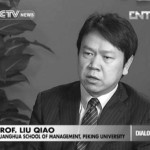 LIU Qiao, Professor of Finance, Associate Dean, Guanghua School of Management, Peking University. Dr. LIU Qiao is a Professor of Finance and Associate Dean at Peking University, Guanghua School of Management. Before joining Guanghua, Dr. Liu served as a tenured professor at Hong Kong University and taught at the Faculty…
LIU Qiao, Professor of Finance, Associate Dean, Guanghua School of Management, Peking University. Dr. LIU Qiao is a Professor of Finance and Associate Dean at Peking University, Guanghua School of Management. Before joining Guanghua, Dr. Liu served as a tenured professor at Hong Kong University and taught at the Faculty… - 67
 event #46, Tuesday, September 22nd, 2015 Speaker JIANG Guohua 姜国华, Professor of Guanghua School of Management and Associate Dean of the Peking University Graduate School ABSTRACT "Emerging from a planned/state-controlled economy and after the economic reform and open door policy of 1978, China launched its stock market in 1990.…
event #46, Tuesday, September 22nd, 2015 Speaker JIANG Guohua 姜国华, Professor of Guanghua School of Management and Associate Dean of the Peking University Graduate School ABSTRACT "Emerging from a planned/state-controlled economy and after the economic reform and open door policy of 1978, China launched its stock market in 1990.… - 60
Read more... -
15 May
LIU Qiao
LIU Qiao, Professor of Finance, Associate Dean, Guanghua School of Management, Peking University.
Dr. LIU Qiao is a Professor of Finance and Associate Dean at Peking University, Guanghua School of Management. Before joining Guanghua, Dr. Liu served as a tenured professor at Hong Kong University and taught at the Faculty of Business and Economics, University of Hong Kong. A renowned financial expert, Dr. Liu worked at McKinsey & Company’s Asia-Pacific Corporate Finance and Strategy Practice and has spent over 15 years conducting cutting-edge research on Asia financial markets. Dr. Liu earned his Ph.D. in Financial Economics form the University of California, Los Angeles and MA in International Finance from the Graduate School of the People’s Bank of China.
Read more... -
15 May
#44 – Finance in China 2.0: From Shadow Banking to Alipay
event #44, Wednesday, May 27th, 2015
Speaker
LIU Qiao, 劉俏, Professor and Associate Dean, Guanghua School of Management, Peking University.
ABSTRACT:
“From China’s shadow banking system to the rapid growth of Alipay and the e-commerce sector, non-traditional finance in China is booming. Professor LIU Qiao, best-selling author and financial expert, will analyze the issues surrounding the new finance sector’s rapid development and the important adjustments it needs to make.”
This event is organized in partnership with:
Guanghua School of Management, Peking University
“To advance management knowledge and develop business leaders for China and the Global Society.”
Peking University, Guanghua School of Management is a leading business school in the Asia-Pacific renowned for its China-expertise and international perspective. Celebrating its 30th Anniversary this year, Guanghua offers a comprehensive business education with programs including full-time graduate and undergraduate programs, part-time and international MBA, EMBA and short-term courses designed for an executive-level immersion in Chinese Business. Guanghua’s students and researchers have international study opportunities at world-class international partner institutions and access to a loyal alumni network of 20,000 people working across the globe. In addition to its main campus in Beijing, Guanghua has campuses in Shanghai, Shenzhen, Xi’an and Chengdu (opening in 2016) and is deeply involved in the economic development of China.
Related Posts
- 66
 event #46, Tuesday, September 22nd, 2015 Speaker JIANG Guohua 姜国华, Professor of Guanghua School of Management and Associate Dean of the Peking University Graduate School ABSTRACT "Emerging from a planned/state-controlled economy and after the economic reform and open door policy of 1978, China launched its stock market in 1990.…
event #46, Tuesday, September 22nd, 2015 Speaker JIANG Guohua 姜国华, Professor of Guanghua School of Management and Associate Dean of the Peking University Graduate School ABSTRACT "Emerging from a planned/state-controlled economy and after the economic reform and open door policy of 1978, China launched its stock market in 1990.…
Read more...



